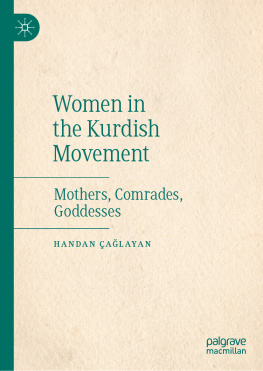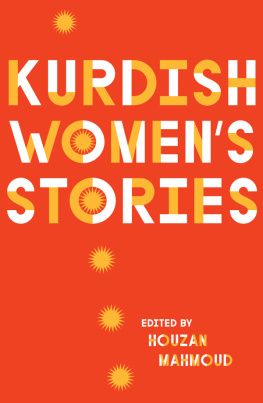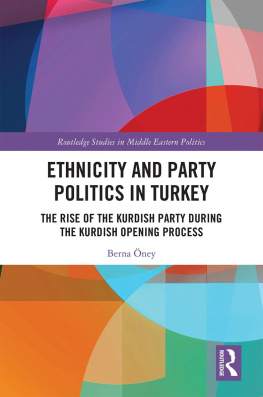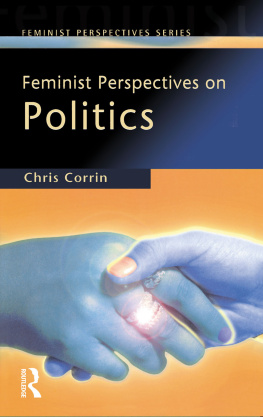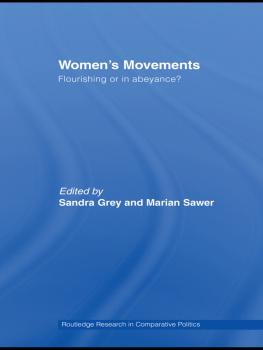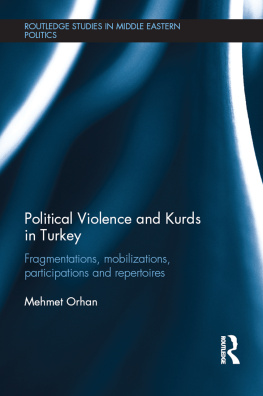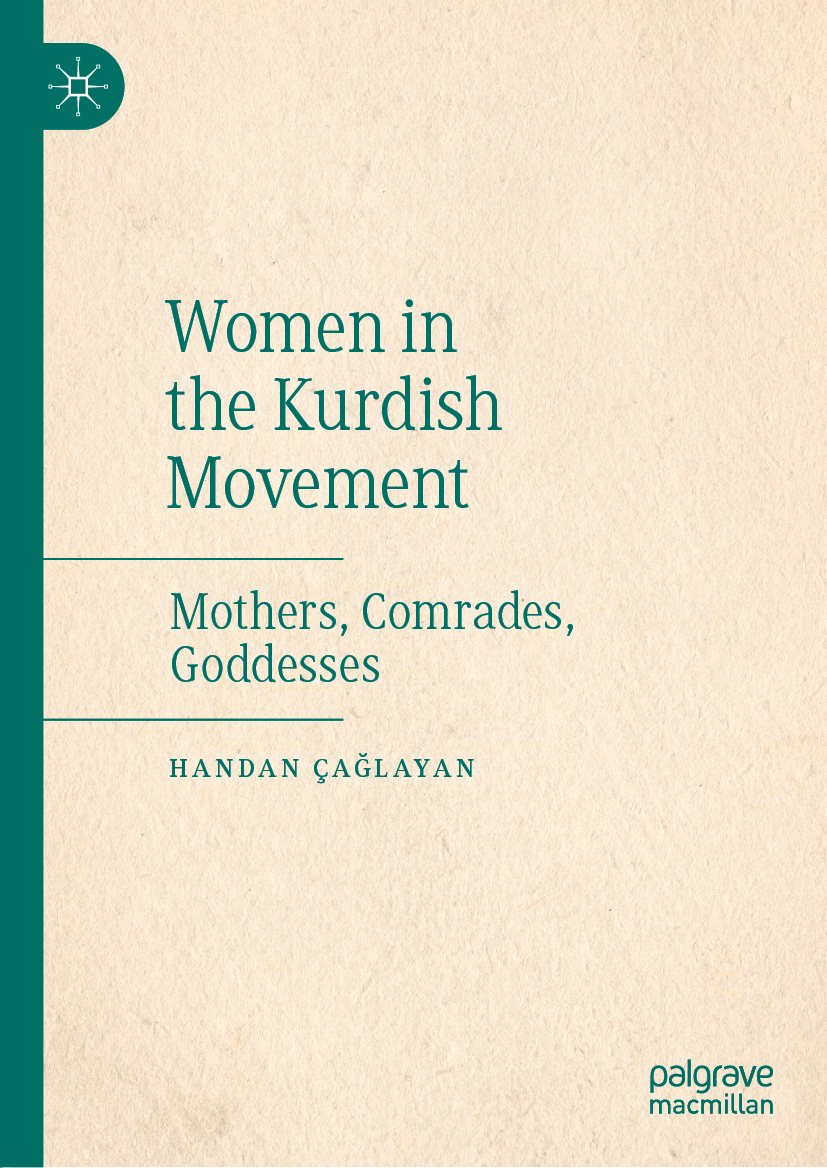Handan alayan
Women in the Kurdish Movement
Mothers, Comrades, Goddesses
Handan alayan
Bamberg Otto Friedrich University, Bamberg, Germany
Translated by Simten Coar
ISBN 978-3-030-24743-0 e-ISBN 978-3-030-24744-7
https://doi.org/10.1007/978-3-030-24744-7
Translation from the Turkish language edition: Analar, Yoldalar, Tanralar: Krt Hareketinde Kadnlar ve Kadn Kimliinin Oluumu by Handan alayan, letiim Yaynlar 2007. All Rights Reserved.
The Editor(s) (if applicable) and The Author(s), under exclusive license to Springer Nature Switzerland AG 2020
This work is subject to copyright. All rights are solely and exclusively licensed by the Publisher, whether the whole or part of the material is concerned, specifically the rights of translation, reprinting, reuse of illustrations, recitation, broadcasting, reproduction on microfilms or in any other physical way, and transmission or information storage and retrieval, electronic adaptation, computer software, or by similar or dissimilar methodology now known or hereafter developed.
The use of general descriptive names, registered names, trademarks, service marks, etc. in this publication does not imply, even in the absence of a specific statement, that such names are exempt from the relevant protective laws and regulations and therefore free for general use.
The publisher, the authors and the editors are safe to assume that the advice and information in this book are believed to be true and accurate at the date of publication. Neither the publisher nor the authors or the editors give a warranty, expressed or implied, with respect to the material contained herein or for any errors or omissions that may have been made. The publisher remains neutral with regard to jurisdictional claims in published maps and institutional affiliations.
This Palgrave Macmillan imprint is published by the registered company Springer Nature Switzerland AG
The registered company address is: Gewerbestrasse 11, 6330 Cham, Switzerland
To Sev and Fadile who represent joie de vivre, hope and resilience who passed by and away untimely, leaving their smiles behind
Foreword
This is a vulnerable book.It is about a vulnerable subject: Knowledge production about and with Kurdish women who have been politicized in the Kurdish movement in Turkey brings in multiple vulnerabilities. First, Kurdish women activists and politicians already experience vulnerability related to their ethnic, gender, and political identities. The researcher is vulnerable in terms of her academic-cum-political priorities to engage in research in such a field, as well as her feminist methodological preferences in social sciences. The researcher/author has a double responsibility in such a setting of knowledge production: in relation to her partners in the knowledge production process and in relation to her research ethics. This vulnerability certainly extends to the translation process, adding to the risks of translation as a rewriting process.
Translation in social science is a dubious writing process. It comprises representation, transfer of interpretations on a specific topic from a certain socio-political and historical setting into a different one, and/or transliteration of a certain world of meanings into another that involves various degrees of remaking the text. Thus, it is both writing a text in another text and an authorial step into the rewriting of the textual representation of human relations on this earth, in a certain socio-political setting, at a certainmoment. Translating Handan alayans seminal work on Kurdish womens politicization in Turkey through the Kurdish political movement from Turkish to English meant as such to me. This process is all the more important due to a number of interrelated reasons. First, it is not only the translation of the Turkish edition of the work (2007). It comprises cooperating in editing and updating the work so as to catch up with the speed of contemporary times that hosted drastic changes in theKurdish issueof Turkeys political landscape. We do so through our feminist ethical priorities which have marked our academic and political engagements for decades. I believeand hope thatthe collaboration that we materialize in this study between a Turkish feminist academic (Simten Coar) and Kurdish feminist scholar and activist (Handan alayan) offers an example for the feminist contribution to scholarly literature that is produced on rights-based priorities for freedom and equality.
I will not detail the process of editing, rewriting, and translation of this prominent work. I will just touch upon the way the idea of this work emerged, the way we proceeded, and the way we endedas a matter of feminist scholarly collaboration where academic and activist concerns speak to each other. Then I will move onto the connotations of this collaboration for the larger crisis-ridden political landscape in Turkey, where ethnicity and gender crosscut the class-based exploitationKurdish issue, and feminist concerns and interventions thus gaining explanatory power in understanding the state of politics in Turkey, and the unfolding of Kurdish political movement in the past four decades.
Spring 2017: We were going through the second year of the Peace Statement, titled, We Will Not Be a Party to This Crime, as the signatories of the statement. The statement was meant to give voice to the academics all around Turkey with a claim to peace in the Kurdish majority regions of the country in the midst of the increasing state violence.I and Handan alayan are among signatories in the first round. By then, we have known each other for more than a decade through our feminist academic and activist engagements. We met in my office at Hacettepe University (Ankara, Turkey), when I was taking steps to retire due to my feeling that it was becoming ever harder to maintain my stance in the academic institutional setup in Turkey. It was a time of confusion, undecidedness, continuous quandary, regarding what to do next and what would be the righteous step in ones academic prioritieswhich, in the final analysis, proved to be a path to disillusionment with our existing academic habitus. In the midst of a rather hectic situation, we started to take steps toward this collaborative work that would last for almost two years and that would be a thoroughly teaching process on my part.
I had read the Turkish edition ofMothers, Comrades, Goddessesmore than a decade ago and learned a lot from a field about which I was almost totally ignorant, except for some occasionaland yet briefencounters with Kurdish feminist or women activists on issue-based platforms within the scope of womens movement in Turkey. But the preparation of the book for the English edition, including its reorganization and translation, offered me a venue for a remarkably different experience with the same text: reading and re-learning and re-forming the text with its authora rare privilege for someone who has been keen on feminist collaborative work. Briefly, the mode of my most recent engagement with the text enabled me to have a broader understanding of challenges that the author has had in all the stages of this invaluable knowledge production process, including its preparation for the English-speaking and English-reading audience.

